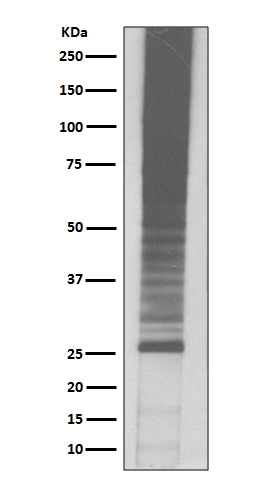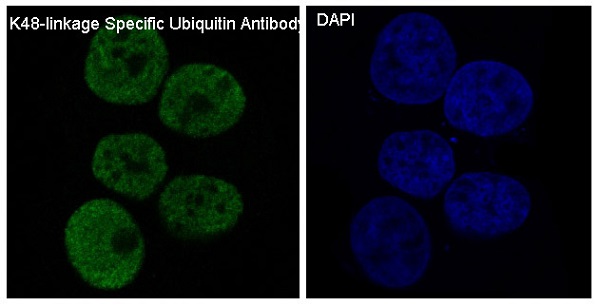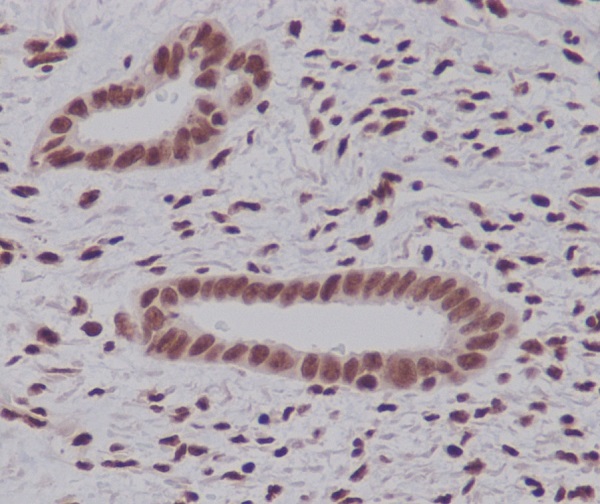


| WB | 1/500-1/1000 | Human,Mouse,Rat |
| IF | 咨询技术 | Human,Mouse,Rat |
| IHC | 1/50-1/100 | Human,Mouse,Rat |
| ICC | 1/50-1/200 | Human,Mouse,Rat |
| FCM | 1/50-1/100 | Human,Mouse,Rat |
| Elisa | 咨询技术 | Human,Mouse,Rat |
| Aliases | FLJ25987; MGC8385; ubiquitin B; Ubiquitin; UBCEP1; UBCEP2; RPS27A |
| Entrez GeneID | 7314 |
| WB Predicted band size | Refer to figures |
| Host/Isotype | Rabbit IgG |
| Antibody Type | Primary antibody |
| Storage | Store at 4°C short term. Aliquot and store at -20°C long term. Avoid freeze/thaw cycles. |
| Species Reactivity | Human,Mouse,Rat |
| Immunogen | A synthesized peptide derived from human K48-linkage Specific Ubiquitin |
| Formulation | Purified antibody in PBS with 0.05% sodium azide. |
+ +
以下是关于Ubiquitin K48抗体的3篇参考文献,涵盖其开发、验证及应用领域:
---
1. **文献名称**:*"Polyubiquitin linkage profiles identify substrates of the proteasome and endogenous modulators of neuronal survival"*
**作者**:Dammer, E.B. 等
**摘要**:该研究开发了针对K48连接的多聚泛素链特异性抗体,用于检测神经元中蛋白酶体靶向的泛素化底物。通过免疫沉淀和质谱分析,揭示了神经退行性疾病中异常蛋白聚集与K48泛素化的关联。
---
2. **文献名称**:*"Methods to monitor ubiquitination and deubiquitination kinetics in vitro and in cells"*
**作者**:Yau, R.G. & Rape, M.
**摘要**:作者系统评估了K48特异性抗体在细胞周期调控研究中的应用,验证了其在免疫印迹和免疫荧光中的特异性,并强调其在追踪细胞周期关键蛋白降解动态中的重要性。
---
3. **文献名称**:*"K48-specific ubiquitin antibodies: insights into antibody specificity and cross-reactivity across polyubiquitin linkages"*
**作者**:Swatek, K.N. 等
**摘要**:通过结构分析和功能实验,该研究比较了不同泛素链抗体的交叉反应性,重点验证了K48抗体的特异性,为研究蛋白酶体依赖性降解途径提供了可靠工具。
---
这些文献涵盖了K48抗体的开发验证、功能研究及在疾病模型中的应用,适用于蛋白质降解机制及治疗策略的探索。
Ubiquitin K48-linked chain-specific antibodies are critical tools in studying the ubiquitin-proteasome system (UPS), a primary pathway for targeted protein degradation in eukaryotic cells. Ubiquitin, a 76-amino acid protein, forms polyubiquitin chains through isopeptide bonds between its C-terminal glycine and lysine residues of another ubiquitin. Among the seven lysine linkage types (K6. K11. K27. K29. K33. K48. K63), K48-linked chains are predominantly associated with proteasomal degradation. K48-specific antibodies selectively recognize this linkage pattern, enabling researchers to identify proteins marked for destruction via the canonical UPS pathway.
These antibodies are widely used in techniques like western blotting, immunofluorescence, and immunoprecipitation to investigate protein turnover dynamics, particularly in cellular processes such as cell cycle regulation, stress responses, and quality control mechanisms. Their specificity helps distinguish K48-linked ubiquitination from other chain types involved in non-degradative signaling (e.g., K63-linked chains in DNA repair or NF-κB activation). Validation typically involves testing against defined ubiquitin polymers to confirm linkage preference.
Research applications span cancer biology (studying oncoprotein stability), neurodegenerative diseases (analyzing pathological protein aggregates), and drug development (screening proteasome inhibitors). Proper experimental controls are essential, as cellular samples contain mixed ubiquitin linkages. Recent advances in cryo-EM and mass spectrometry have reinforced the importance of K48 chain detection in understanding substrate recognition by 26S proteasomes.
×